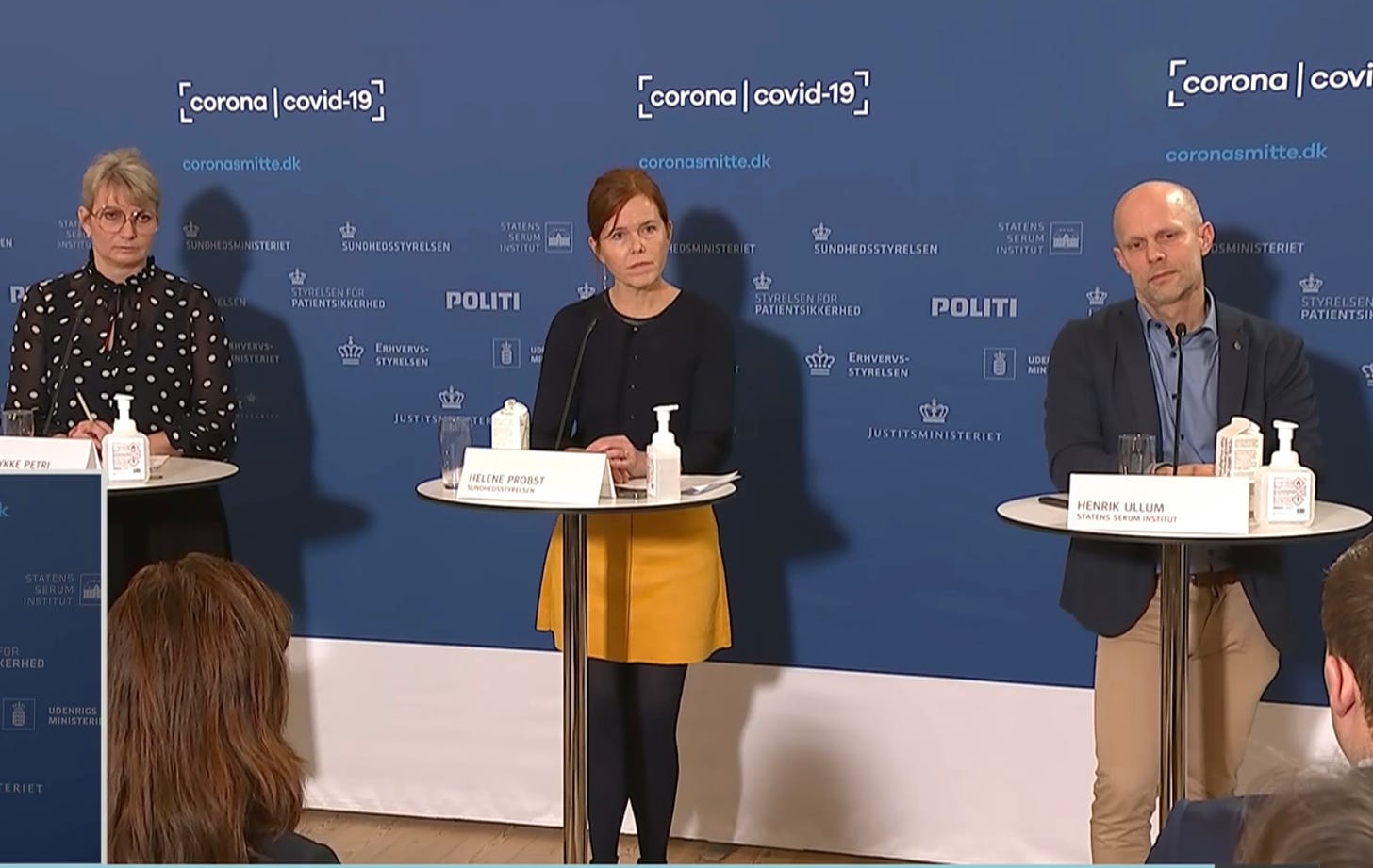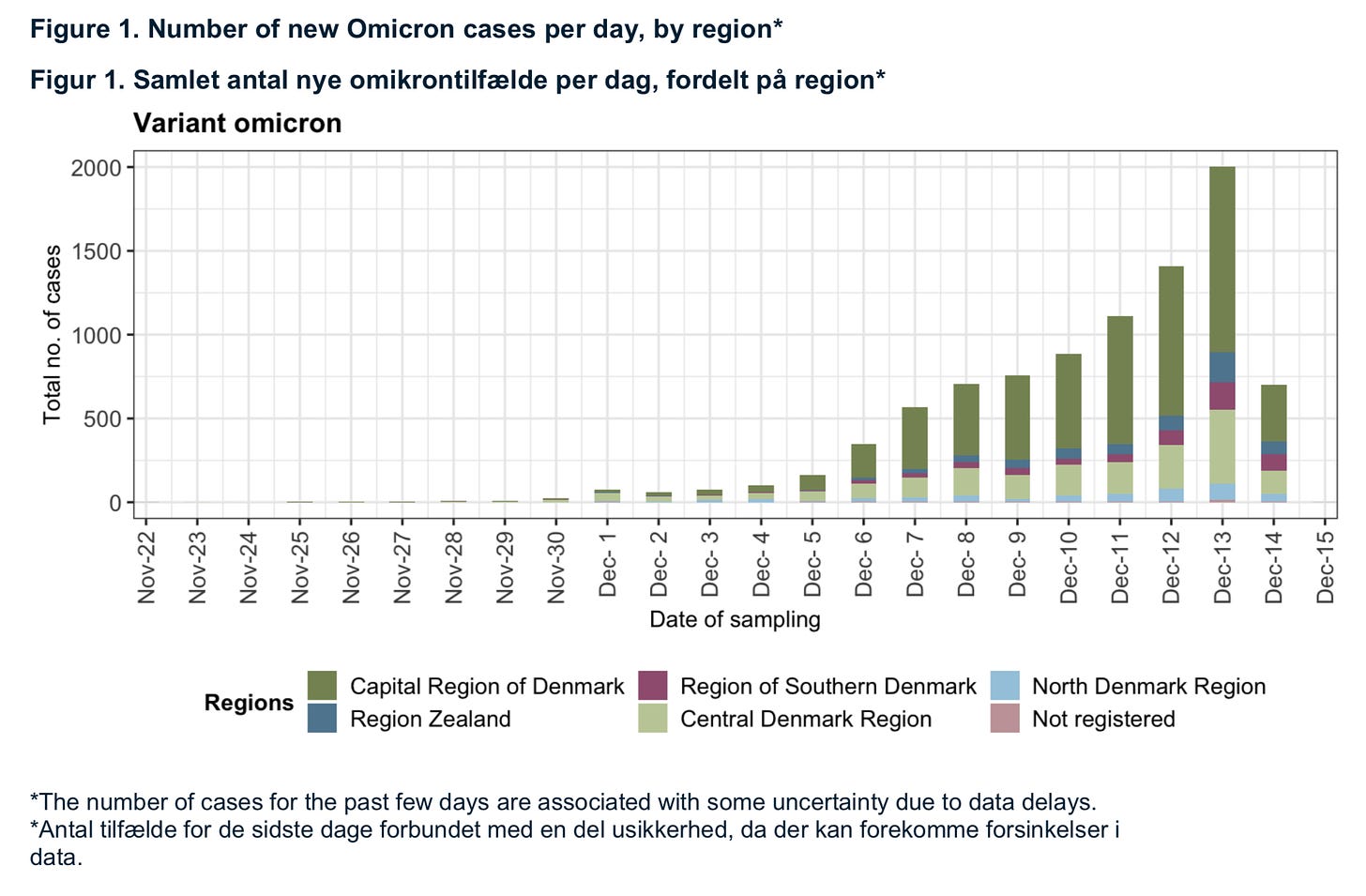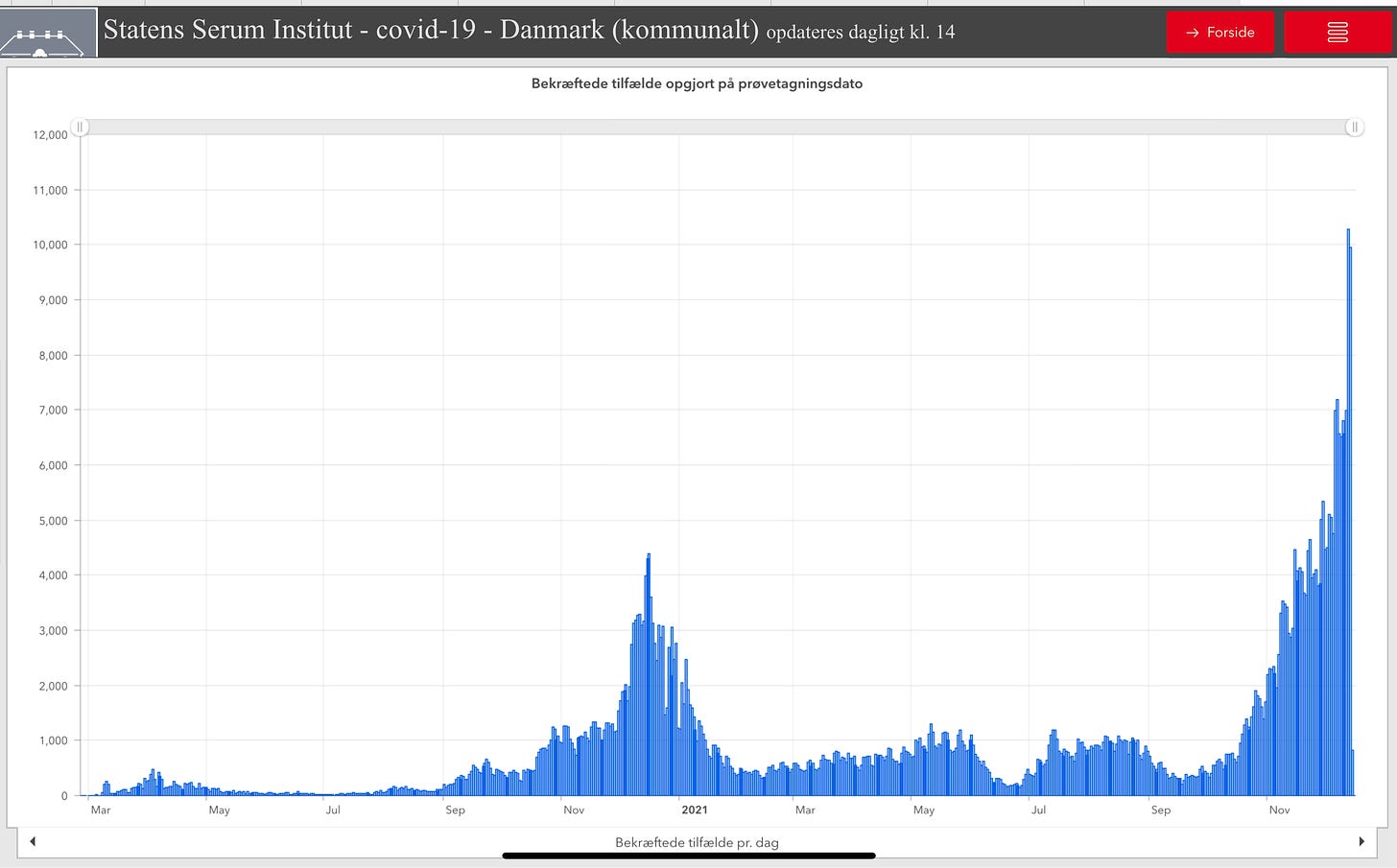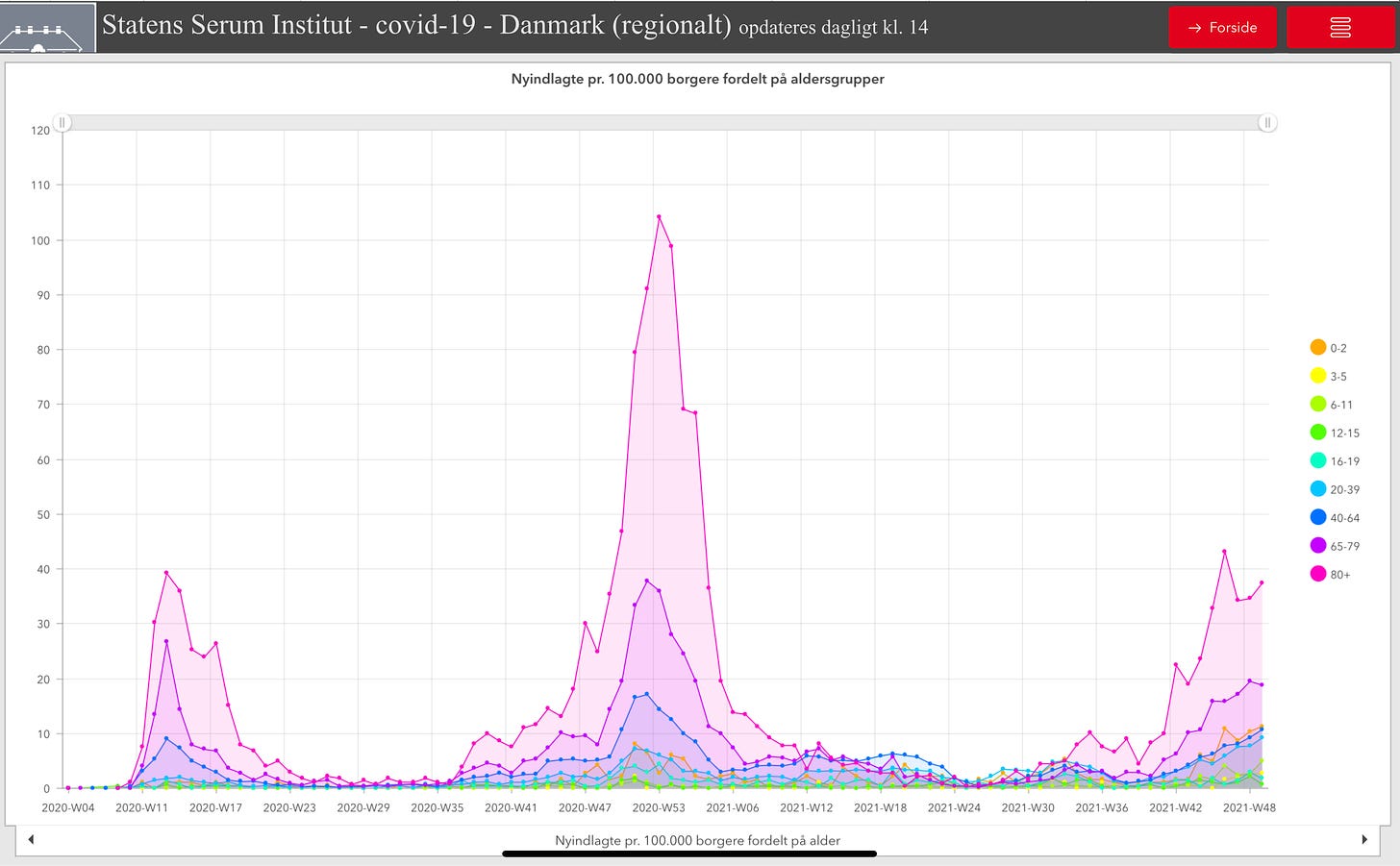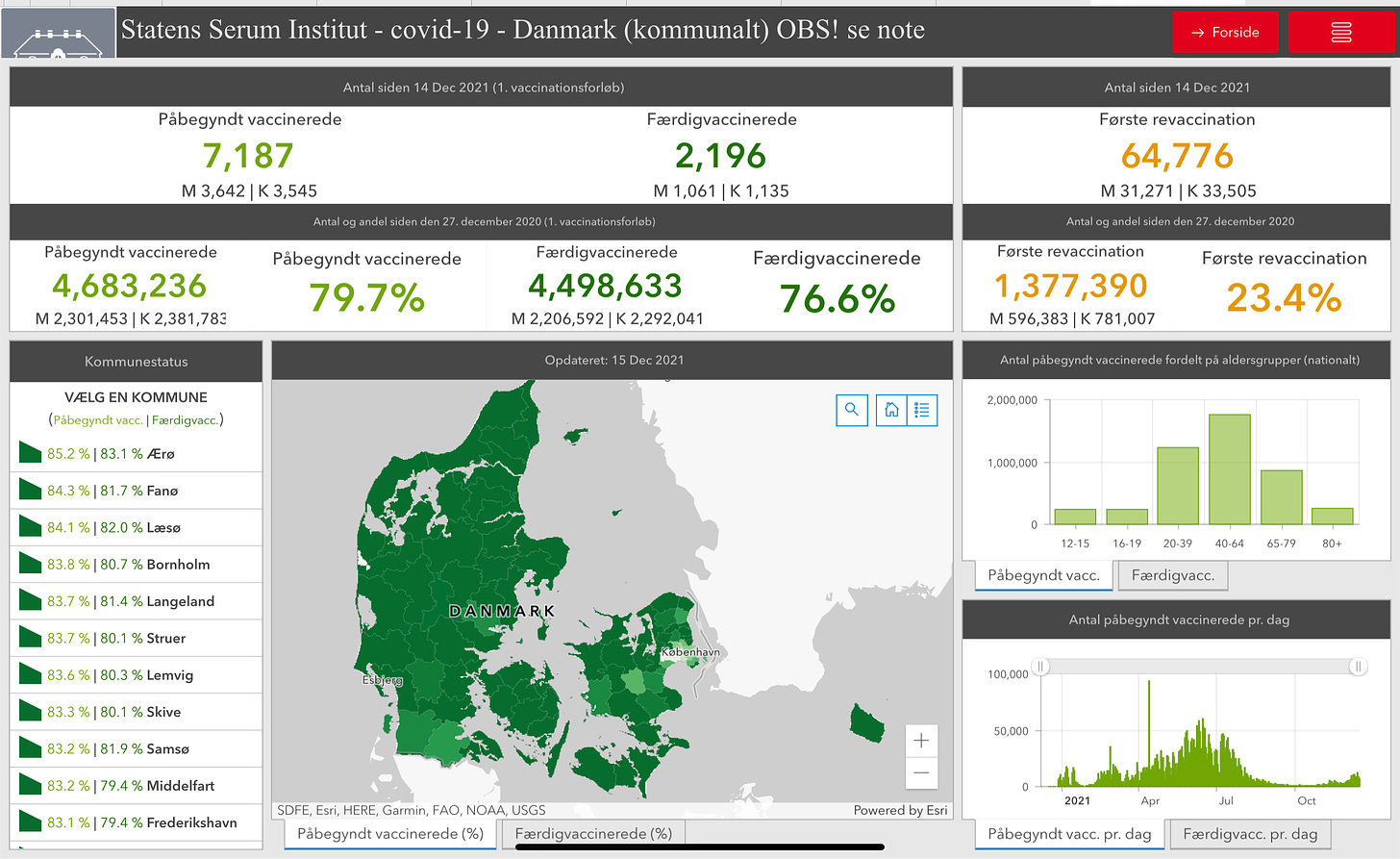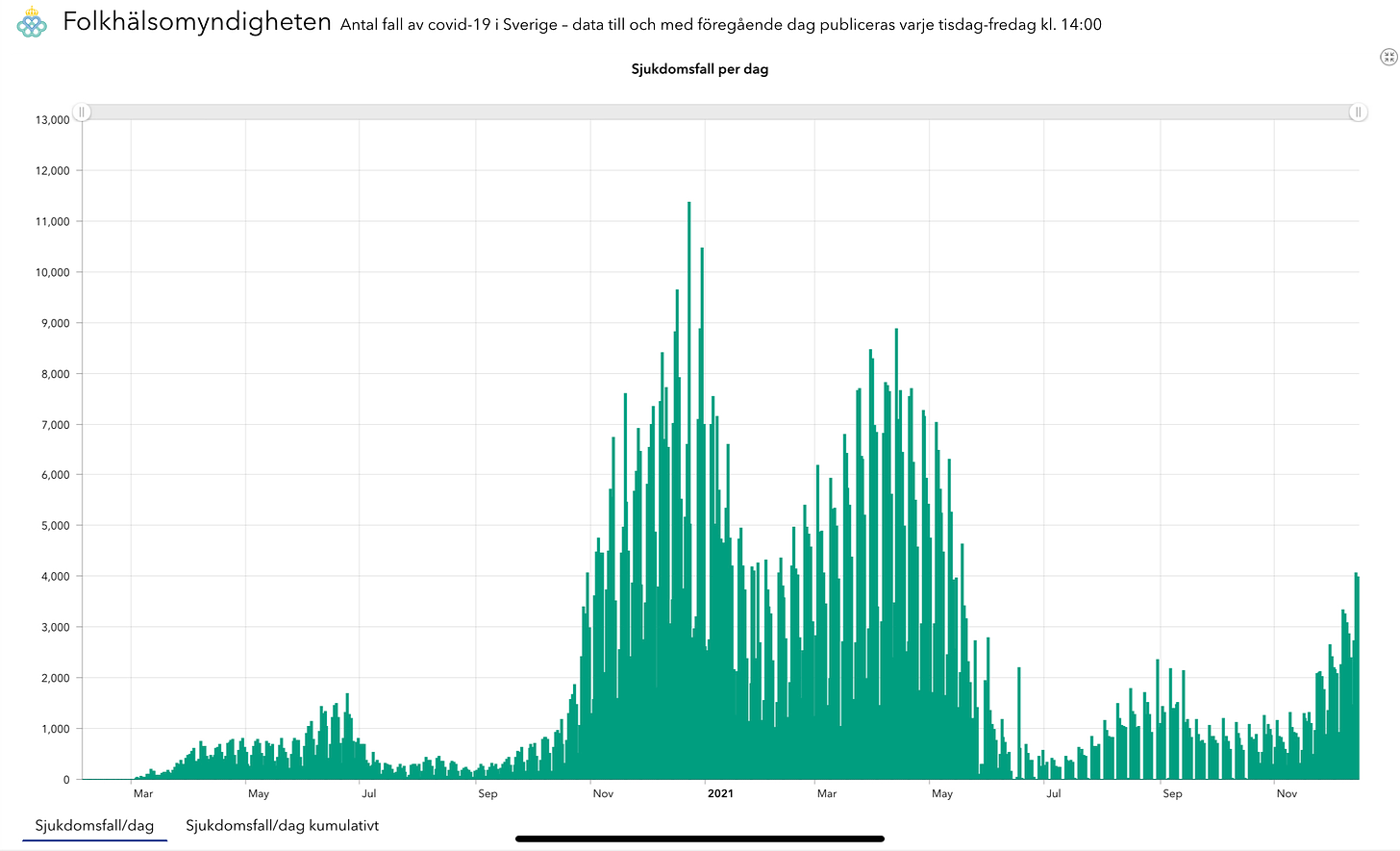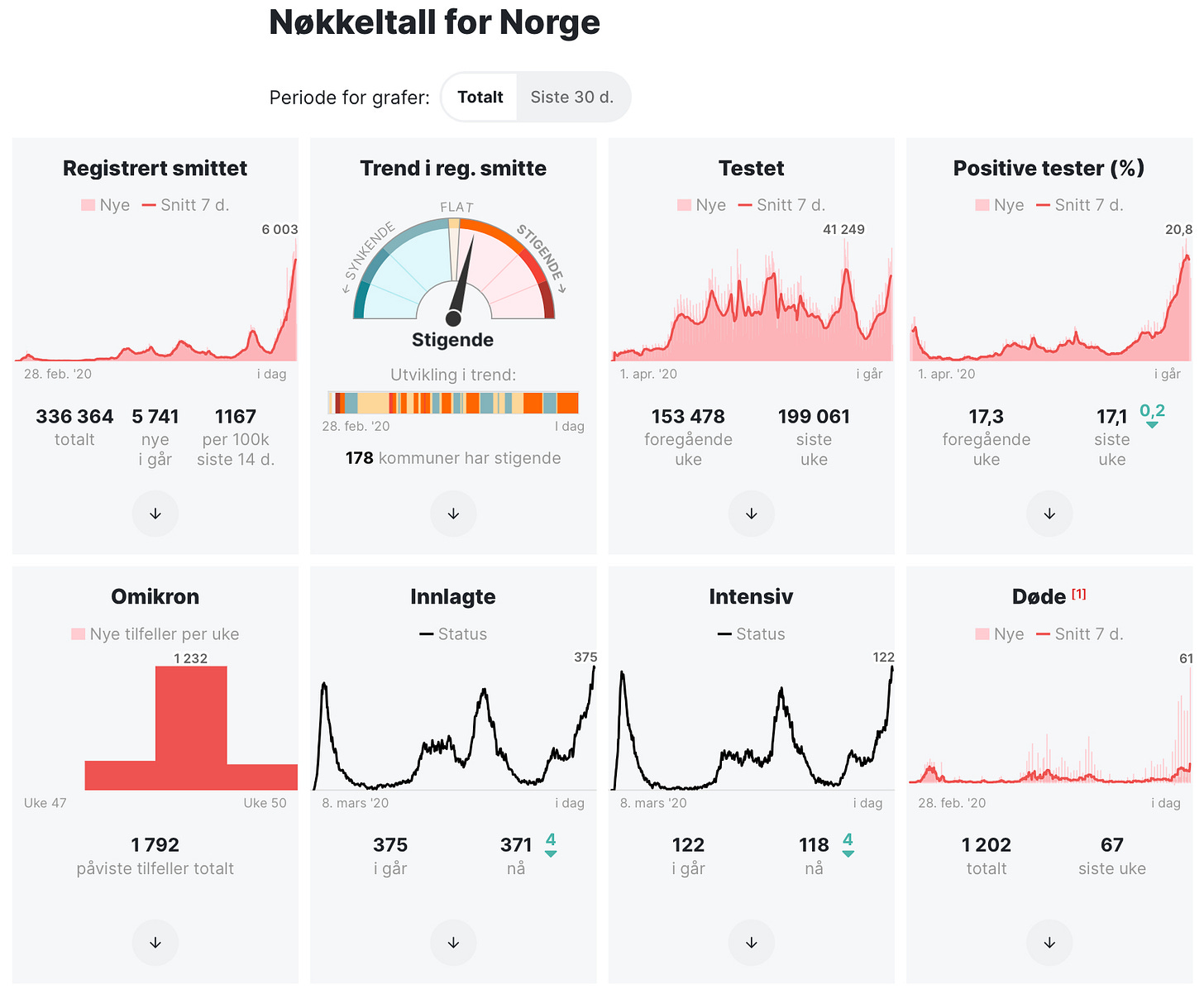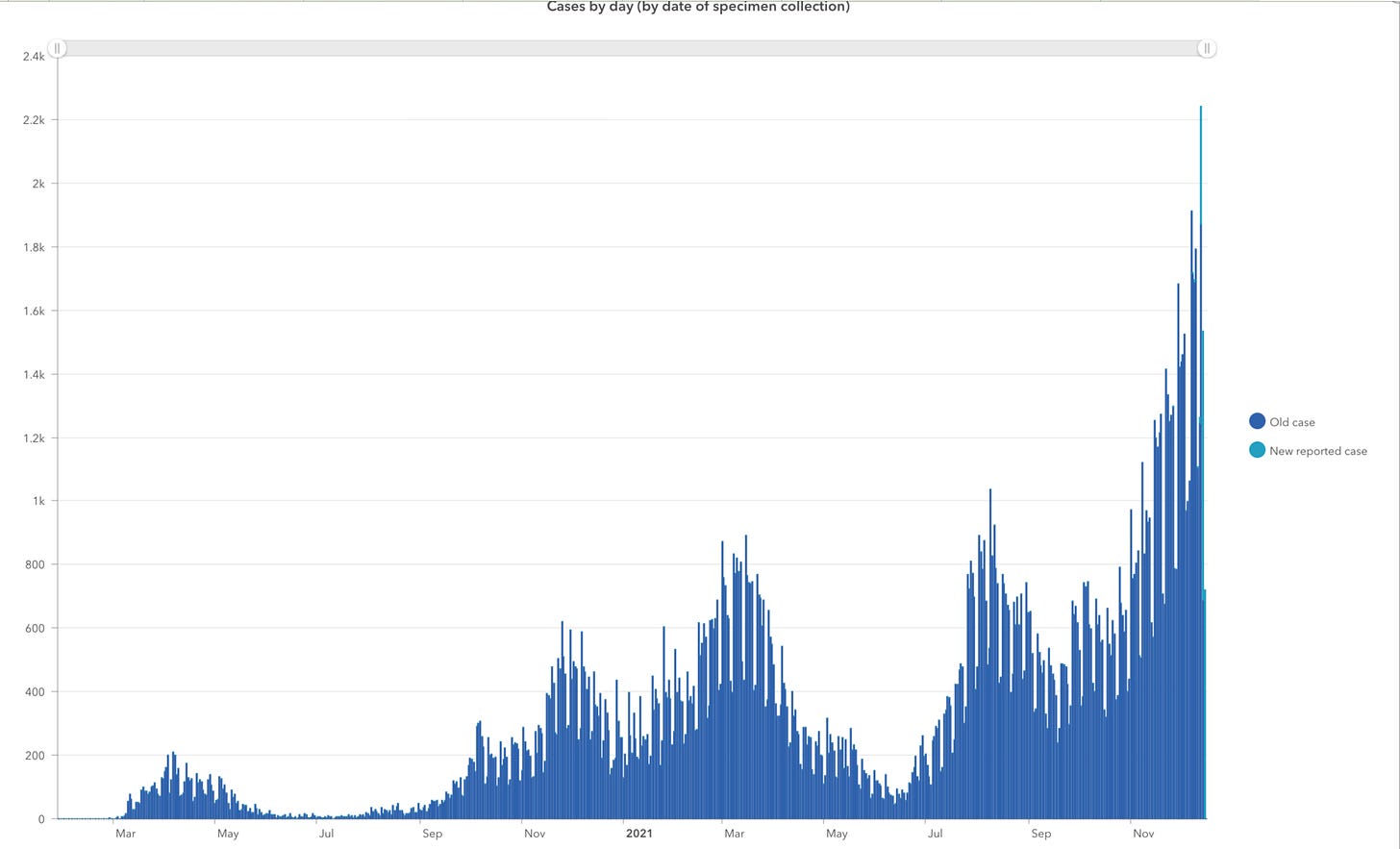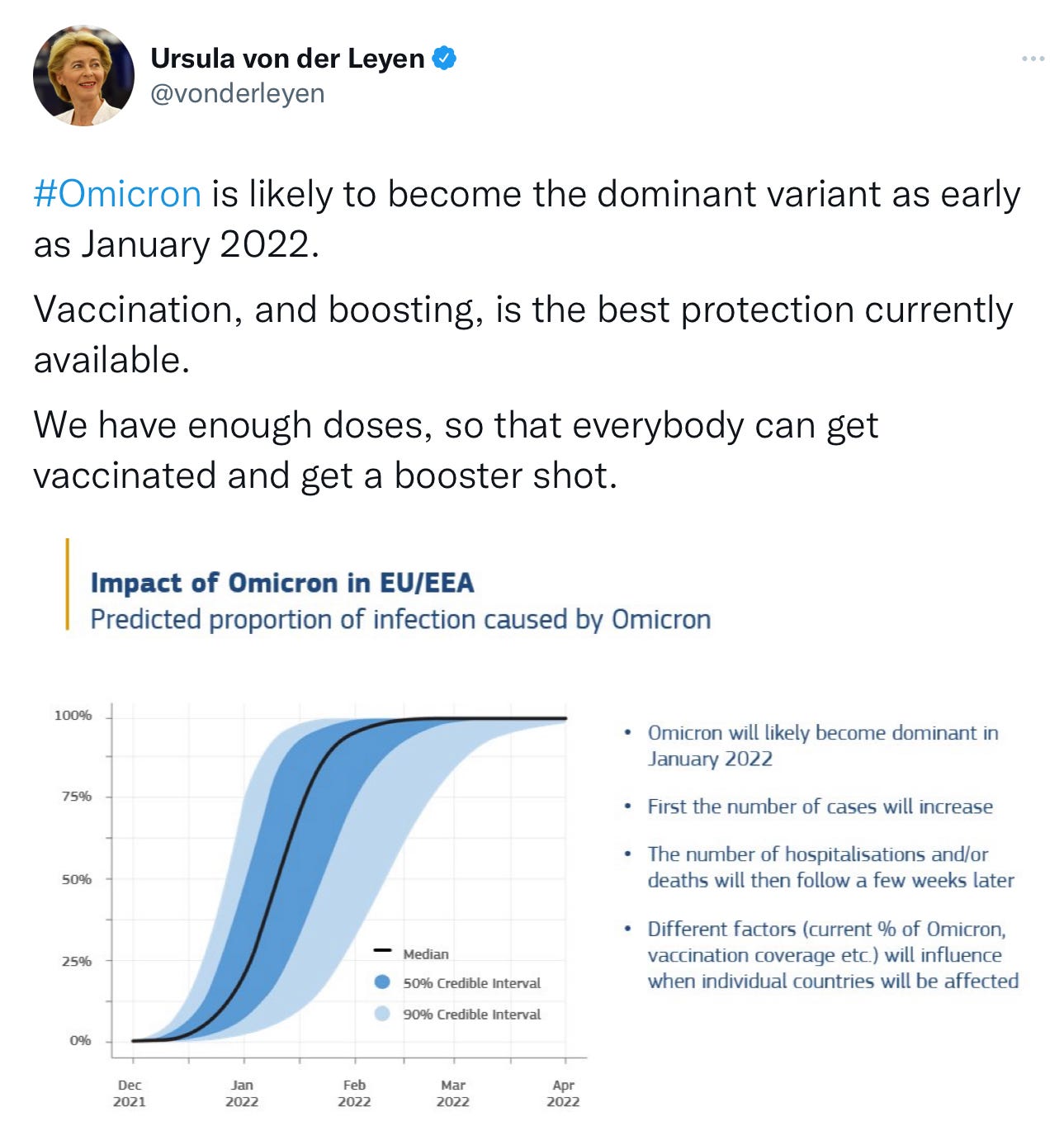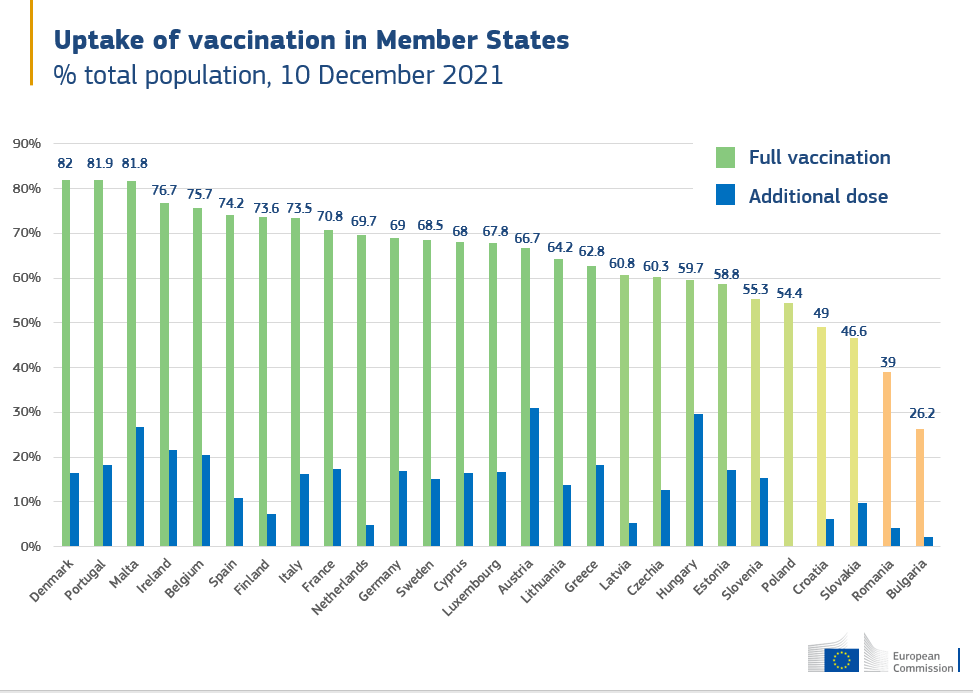🇩🇰
Danish Prime Minister Mette Frederiksen left little doubt that new restrictions are on the way. Frederiksen posted to her Facebook shortly before today’s COVID news conference with the directors of various Danish health agencies.
“I have no doubt that new initiatives will be needed to break the chains of infection. The Epidemic Commission is working on it, and as soon as we can say more, we will of course do so. The most important thing is still to get the 3rd dose. The sooner the better.”
TV2 is reporting that a government briefing from the ministry of health for the party’s health rapporteurs will be held on Friday morning, another sign more restrictions are on the way. Health Minister Magnus Heunicke also spoke to TV2 and said the Epidemic Commission is currently assessing the need for new measures.
-
In a Thursday press conference, the heads of the three biggest Danish health agencies updated the Omicron situation. Staten Serum Institut Director Henrik Ullum said the circumstances are serious and “the storm” will continue to get worse unless something is done.
“The infections increase we have seen in the autumn and winter have been driven by the Delta variant, but now it is more and more the Omicron strain that dominates. Infection numbers will continue upwards unless we do something. The problem is, of course, that if infection numbers continue to rise, the number of coronavirus patients can also rise, and this will put a strain on our healthcare system.”
That said, Ullum added, COVID hospitalizations, while not ideal right now, are still in much better shape than they were a year ago during the Alpha variant wave. He says this is clearly the result of vaccines being very effective at preventing serious illnesses and hospitalizations.
Ullum, who sits on the Epidemic Commission, said they expect the Omicron wave to keep pushing case numbers up. He pointed a finger at partying young people, especially those in Metro Copenhagen, that have “helped drive infection numbers upward.” He says there have been several large super-spreading events connected to parties, concerts, and other nightlife and cultural events. Ullum said the Commission has advised politicians on new measures to take, but he wouldn’t provide specifics.
Ullum also appeared to rule out a lockdown saying essentially it is too late because the Omicron variant is already everywhere. This is an infection wave that he says will also be tough to avoid, especially for the unvaccinated.
“If someone is not immune at present, it will be difficult to avoid getting infected.”
Danish National Health Board Assistant Director Helen Probst said the arrival of the Omicron variant is concerning.
“There's still a lot about Omicron that we do not know. But the large number of infected people is worrying. It was completely expected that there would be an infection wave this winter, but Omicron has taken it somewhere else. We need to do even more. Avoid morbidity and secure health care. The tools are not new. But we should probably have some more of them in use.”
Probst says 77% of those 12 to 15 years old either have a first vaccination dose or have an appointment scheduled to get one. She is urging people to get a booster dose as fast as they can, ideally before Christmas, and for parents to get their children down to a vaccination center. She says there are 850,000 open bookings to get vaccinated, with lots of openings both for adults and children.
“It is a really good idea to get vaccinated now before we go on our Christmas holidays, or are going home for Christmas and celebrating with our families.”
Probst is also very concerned about the strain on hospitals, especially intensive care units, and said she has asked the regions for immediate concrete plans to expand capacity in order to be able to handle a possible influx of Omicron infections.
The Director for the Danish Agency for Patient Safety, Anette Lykke Petri, says with the arrival of the Omicron variant they are now seeing more frequent and much larger outbreaks. There has also been an increase in outbreaks in residential areas and in healthcare centers. Petri says agency contact tracers report that a third of the people they talk to say they were infected by someone in their own household or in their close circle of family or friends. She says they are also hearing increasing reports of people who are infected but go to work in healthcare facilities anyway. Petri says while this is obviously “not acceptable” she adds, it is also a reflection of the sad reality of dire staffing shortages plaguing the healthcare sector, leaving people with little or no choice.
-
The Omicron variant continues to explode across Denmark as the latest Staten Serum Institut update has confirmed a whopping 2,962 additional cases of the variant in the last 24 hours. That pushes the to-date total number of Omicron cases in the country to 9,009.
78.9% of Omicron infections so far have been among people who are fully vaccinated.
There are 57 total hospitalizations so far, but there are fewer than 22 people currently in hospital.
-
For a 4th day in a row Denmark is reporting a record high number of daily COVID cases with 9,999 today along with 12 more coronavirus deaths.
Yesterday, 436,289 total corona tests were done, of which 208,498 were PCR tests equaling a positivity percentage of 4.79%.
-
COVID hospitalizations (517) continues to rise (+9) while the number of infected people in an ICU (61) dropped (-5) and of those the number on a ventilator (42) also edged downward (-1).
-
On the vaccination front booster doses led the way again yesterday making up 64,776 of the 74,159 total inoculations on Wednesday.
So far, 79.7% of the total population have had one vaccine dose, 76.6% have had two, and 23.4% have had a booster dose.
-
If you live on Bornholm vaccination capacity is being increased in order to try and get everyone who is eligible on the island a booster dose before Christmas. Everyone over the age of 40 on Bornholm can book a vaccination appointment to get a third dose. As of Friday, vaccinations can now be done at a new facility at Bornholm hospital. As of Friday people on Bornholm can get vaccinated at two locations. The site at Ullasvej 39 C can take adults and children, while the hospital location at Ullasvej 8, Entrance U can only take people 12 years old and older.
-
The Danish National Health Board has recommended the use of a COVID treatment pill from the pharmaceutical company Merck despite it not being approved for use yet in Europe. The health board says people who are at high-risk, like seniors, can be prescribed the pill by their family doctor. However, the timeline will be extremely narrow. The pill is effective only if taken within five days of becoming symptomatic. Vulnerable people will have to contact their doctor and get a prescription almost immediately after testing positive.
Section Manager Kirstine Moll Harboe:
“We recommend the tablet because we believe that the benefits of being treated outweigh the disadvantages for those patients who have the greatest risk of becoming seriously ill with COVID. We expect that the treatment will help to reduce the chances of vulnerable people becoming seriously ill. At the same time, we are fully aware that it is a new and unapproved treatment, that we do not yet have much knowledge about it. That is why we keep a close eye on those who are being treated with the pill.”
🇸🇪
Sweden has added 4,022 infections and another five corona deaths since yesterday’s update.
So far, 7,698,670 1st vaccine doses (85.2% of the population aged 12 years old and older) and 7,313,144 2nd doses (80.9%) have been administered. Of the fully vaccinated 18 years old and older 1,927,627 people have had a booster dose (23.2%) done.
-
Sweden will soon tighten entry requirements even for visitors from fellow Nordic countries who have until now been exempt. The Swedish Public Health Agency has recommended that a coronapas be required when crossing the Swedish border and that all visitors be required to take a COVID test as soon as possible after entry. This would apply to travelers from Denmark, Norway, and Finland. The requirement would apply regardless of vaccination status.
Regular commuters into Sweden for work can get tested once a week to be exempted from the new requirements.
The agency cites soaring infection numbers from its Nordic neighbours and the threat of the new Omicron variant in recommending the Swedish government make the change. The request seems to have fallen on receptive ears as Swedish media outlet TT is reporting the requirements will come into force as of December 22.
Sweden currently requires a vaccine passport to enter the country for all travelers except those from its Nordic neighbours.
-
Sweden could see even more COVID restrictions being announced next week. The Swedish Minister of Social Affairs Lena Hallengren and Director General of the Public Health Agency Karin Tegmark Wisell said on Thursday the epidemic situation is not looking good and more measures may be coming. They wouldn’t specify what that meant or what might be announced next week. It is also worth noting that the Swedish Public Health Agency will table new COVID forecasts next week as well.
🇳🇴
Norway has added 5,508 infections and had no new pandemic deaths in the last day.
There are 1,792 total Omicron cases confirmed so far.
COVID hospitalizations (371) and ICU numbers (118) are down (both -4).
So far, 79.1% of Norwegians 12 years old and older have had one vaccine dose, 72.2% have had two, and 21.1% have had a booster shot.
-
The latest weekly assessment of Norway’s epidemic situation doesn’t paint a pretty picture. The Norwegian Institute of Public Health says total coronavirus infections increased by 25% last week compared to the week before. The agency says infections have increased ten-fold in the last eight weeks. Young children five years old and younger are seeing the highest increase in COVID infections, while those six to 12 years old had the most cases per 100,000 people.
Things aren’t much better for Norwegian hospitals. There were 222 new COVID patients last week, up from 217 the week prior. ICU admissions have shot up to 66 last week compared to 47 the week before. The NIPH says the biggest increase by age were those 18 to 29 years old. The agency also emphasizes the rate of hospitalization and death was “significantly higher” for those who were not vaccinated compared to those who were.
The NIPH says the Delta variant may still be king in Norway, but its days appear to be numbered. For months, the Delta variant has been responsible for 99% of all Norwegian infections. Now, the national health agency says, in a few short weeks the Omicron variant has gone from the first confirmed case to being 5.8% of all infections just last week.
-
The Norwegian Institute of Public Health says influenza numbers are starting to increase with more of the ‘A’ strain (H3N2) detected last week it notes this reflects a similar trend seen in other European countries and in its Nordic neighbour, Sweden. As of week 48 in Norway, respiratory infections including the RS virus, influenza, and others were responsible for 78% of all respiratory infection-related hospital admissions. To contrast COVID accounted for 22%.
🇫🇮
Finland has registered 1,981 infections and had two more virus deaths in the last 24 hours.
COVID hospitalizations (314) are up (+18).
To date, 77% of the total population have had one vaccine dose, 73% have had two, and 10.8% have had a booster dose.
-
The latest weekly COVID snapshot from the Finnish Institute for Health shows a worsening epidemic situation. The agency says COVID cases are on the rise, with 10,500 recorded last week. It says there are now a total of 34 confirmed Omicron infection cases, but “preliminary screening tests indicate that cases of the Omicron variant are clearly increasing.” Finland had a positivity percentage of 7.2% last week.
There were 171 hospitalizations last week, of which 52 were admitted to an intensive care unit.
In the last two weeks, Finland has suffered another 98 coronavirus deaths, of which the institute says 78% were people over the age of 70.
17 Finnish regions saw increasing rates of COVID activity and were rated to be in the “community transmission” phase of Finland’s three-tiered COVID risk assessment system.
-
As of Thursday afternoon travelers arriving in Finland from Denmark, Norway, Nigeria, and the UK must have a negative COVID test no more than 48 hours old prior to departure. All travelers from the four countries also must take a COVID test on arrival regardless of vaccination status. Finnish authorities are also looking at extending the requirement to travelers from all non-Schengen countries. If approved it would come into force next Tuesday.
-
The Finnish Institute for Health is tweaking COVID testing requirements to include fully vaccinated people who are symptomatic if more than five months have passed since they had a second dose. People at high-risk and pregnant women should get tested as soon as possible if they develop symptoms regardless of vaccination status.
Testing of asymptomatic people is also being broadly expanded in order to better screen for COVID variants, ie Omicron.
-
Finland’s parliamentary Constitutional Law Committee approved a proposed requirement that health and social care workers must abide by a vaccination mandate. The cross-party committee ruled the legislation was constitutional paving the way for the required ratification to make it law.
🇫🇷
As of midnight Saturday, France will ban all non-essential travel to and from the United Kingdom, according to AFP.
Per a statement from the French government:
“[There will be a] requirement to have an essential reason to travel to, or come from, the UK, both for the unvaccinated and vaccinated... People cannot travel for tourist or professional reasons. Faced with the extremely rapid spread of the Omicron variant in the UK, the government has chosen to reinstate the need for an essential reason for travel from and to the UK.”
French and EU citizens can still return home from the UK as the French government has warned that a “drastically tighter” border control system will soon be in place. The tightened rules will require a negative COVID test no more than 24 hours old to enter France from the UK, and a seven day quarantine on arrival with an out on day three with a negative test. The French strategy is to try and slow the spread of the Omicron variant in order to buy more time to administer booster doses and increase societal protection.
🇪🇺
On the heels of yesterday’s warning from the European Centre for Disease Prevention and Control that an Omicron variant infection wave could overwhelm EU hospitals, the President of the EU Commission says the variant is weeks away from becoming dominant in Europe.
Ursula von der Leyen also says that 67% of the EU population is vaccinated and specifically points to concerning situations in nine countries with vaccination coverage of less than 60%. She says the vaccination pace needs to pick up as the current wave is already straining healthcare systems and the European economy. This with the threat of the Omicron variant sending infection numbers into the stratosphere.
🇪🇺💉
The European Medicines Agency has recommended that a booster dose of the Johnson & Johnson COVID vaccine can be administered two months after a first dose for those 18 years old and older. The EMA cites studies showing a second dose gave a significant boost to antibodies against the coronavirus.
The agency also concluded that the Johnson & Johnson shot can be given as a booster for anyone who has had two doses of either the Pfizer/BioNTech or Moderna mRNA vaccines.
-
The EMA has given its stamp of approval to another COVID vaccine manufacturing site in Marcy-l'Étoile, France. The facility will be run by Sanofi Pasteur and will manufacture doses of the Johnson & Johnson one-shot vaccine.
The agency has also given its approval for a ramping up of production of the Moderna vaccine at a facility in Madrid, Spain. The expansion of the site will increase production of Moderna doses by another 50%. Or about 25 million more vaccine doses every month. Those doses will either be distributed within the European Union or be allocated to the international COVAX initiative.
🇨🇦
Global Affairs Canada is contacting Canadians abroad to advise them of the new travel advisory against all non-essential travel outside the country until further notice. For Canadians abroad, the agency is advising them to cut their trip short and return home as soon as possible. If you cannot return home, it advises you make sure you have the finances and necessities to tough it out should options to return home evaporate.
It is warning of the possibilities of countries imposing sudden lockdowns, leveling entry or even exit bans, and in extreme cases, if the Omicron wave gets really dire, the closing of borders and airports. It warns any of these measures could result in Canadian travelers being stranded abroad.
-
In Ontario Thursday there were 2,421 new COVID cases, the highest daily number since mid-May, along with nine more deaths. There are 328 people in hospital, of which 256 are either not vaccinated or have a single dose. Of the 165 in an ICU, 141 have either one dose or none at all.
Quebec reported 2,736 new infections and five more deaths. The province has announced a number of COVID restrictions Thursday, including reimposing mask mandates, requiring everything from bars to churches to slash capacity in half, and one again banning karaoke and dancing.
In Atlantic Canada, Nova Scotia registered a record-high 287 new infections. New Brunswick has 177. Newfoundland and Labrador has yet to report.
Manitoba saw 218 new coronavirus cases and two more deaths on Thursday.
There were 55 infections in Saskatchewan Thursday.
Alberta logged 473 new corona cases.
B.C. recorded 753 new COVID cases and three more deaths as infections numbers rise again.





